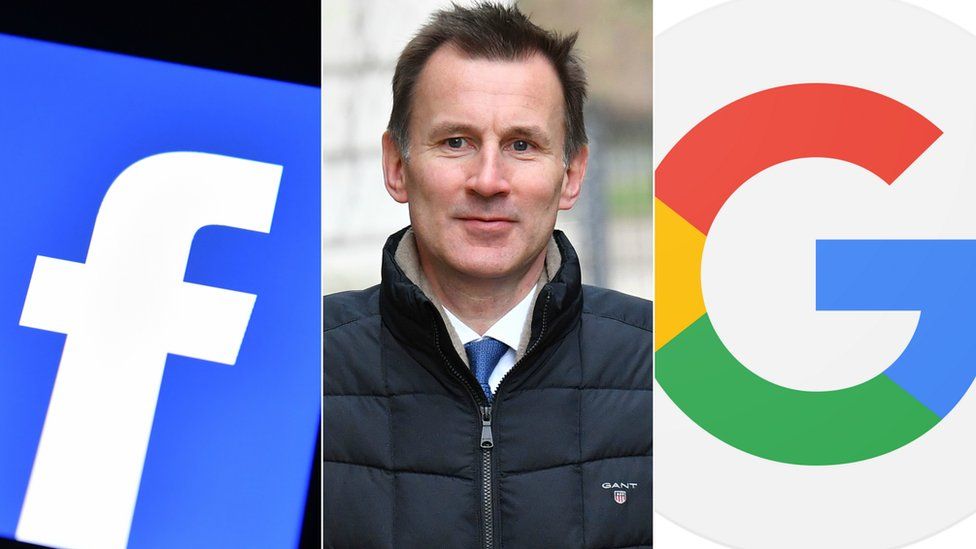Jeremy Hunt threatens social media with new child-protection laws
- Published

Social media firms are being threatened with new laws if they don't do more to protect children online.
In a letter to companies including Facebook and Google, Health Secretary Jeremy Hunt accuses them of "turning a blind eye" to their impact on children.
He gives them until the end of April to outline action on cutting underage use, preventing cyber bullying, and promoting healthy screen time.
Google and Facebook say they share Mr Hunt's commitment to safety.
The age requirement to sign up to Facebook, Instagram, Twitter and Snapchat is 13. To use WhatsApp or to have a YouTube account, you must also be at least 13.
In his letter to the internet firms, Mr Hunt said: "I am concerned that your companies seem content with a situation where thousands of users breach your own terms and conditions on the minimum user age.
"I fear that you are collectively turning a blind eye to a whole generation of children being exposed to the harmful emotional side effects of social media prematurely.
"This is both morally wrong and deeply unfair to parents who are faced with the invidious choice of allowing children to use platforms they are too young to access or excluding them from social interaction that often the majority of their peers are engaging in."
'Phone jailer'
Conservative MP Liz Truss said she had resorted to physically locking her 12-year-old daughter's phone away.
"I have a box which I lock up and put my daughter's mobile phone in and I'm known as the phone jailer in our household," she told Pienaar's Politics on Radio 5 Live.
"It's not just the internet, it's screen time over all. It's part of being a good parent. I think social media companies can play a part and help parents in that job."
Mr Hunt met social media companies six months ago to discuss how to improve the mental health of young people who use the technology.
He told the Sunday Times, there had been "warm words" and "a few welcome moves" since then, but the overall response had been "extremely limited" - leading him to conclude that a voluntary, joint approach would not be good enough.
"None are easy issues to solve I realise, but an industry that boasts some of the brightest minds and biggest budgets should have been able to rise to the challenge," said Mr Hunt.
What can parents do?
- Understand the risks that your children may be exposed to - including cyberbullying, grooming, illegal or unsuitable content
- Make use of parental controls that give you the ability to filter the type of content your children can see when they are online. With younger children, have access to passwords to regularly check content
- Show them how to use privacy settings and the report and block functions on sites and apps
- Talk regularly to them about what they do online, what posts they have made that day, who they are friends with and how it is affecting their mood
- Keep an eye on how much time children spend online. Consider bans on devices at mealtimes and take them away an hour before bedtime. Do not let children charge devices in their rooms
- Source: Internet Matters - more advice here for keeping your kids safe online
The National Bullying Helpline, a charity which deals with online bullying, said the government needed to introduce legislation to govern the social media companies.
"Asking Facebook and other social media giants to regulate themselves is like asking the press to regulate themselves. It won't happen," it added.
Mr Hunt said the government would not rule out introducing new legislation to tackle the issue when it publishes its response to the Internet Safety Strategy consultation in May.
Prof Sonia Livingstone is an expert on child online safety
He has also asked the chief medical officer to launch a review into the impact of technology on the mental health of children and young people.
Katie O'Donovan, public policy manager at Google UK, said the company had shown its commitment to protecting children by developing its resources - such as an online safety course which has been taught to 40,000 schoolchildren.
Facebook said it welcomed Mr Hunt's "continued engagement on this important issue" and shared his ambition to create a safe and supportive environment for young people online.
"We continue to invest heavily in developing tools for parents and age-appropriate products to meet this challenge and we look forward to continuing to work with our child safety partners and government to make progress in this area," said Karim Palant from Facebook .
- Published21 February 2018
- Published26 February 2018
- Published4 January 2018